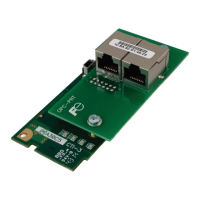9 PROTOCOL-SPECIFIC INFORMATION
This section will discuss topics that are specific to each of the supported protocols.
9.1 Modbus/TCP
9.1.1 Overview
The interface card supports Schneider Electric’s Modbus/TCP protocol, release 1.0. The interface is
conformance class 0 and partial class 1 and class 2 compliant, and allows up to 8 simultaneous
Modbus/TCP client connections (sockets). Other notes of interest are:
• Supported Modbus/TCP functions are indicated in Table 19.
Table 19: Supported Modbus/TCP Functions
Function
Class
Diagnostics (subfunction 0 only)
• To calculate the register number for a function code, refer to section 4.1.
• Inverter registers can be addressed as holding registers (4X references) and input registers (3X
references).
• Specific bits within inverter registers can be accessed as either coils (0X referenc es) or discrete
inputs (1X references).
• Write data checking is not available (refer to section 4.2.) For example, if a write is performed to a
register with a data value that is out-of-range of the corresponding function code, no Modbus
exception will be immediately returned.
• The “unit identifier” (UI) field of the request packets is ignored and is echoed in the response.
• Modbus/TCP should not be confused with Modbus (serial) over TCP. Modbus over TCP is not
compatible with Modbus/TCP and is not supported.
• The driver can be configured to detect a timeout (communication loss) and perform a timeout
action.
9.1.2 Holding & Input Registers
The inverter registers by default are mapped as both holding registers (4X) and input registers (3X) and
are accessed by using the inverter register numbers described in section 4.1. The 4X and 3X only serve
as a naming convention for holding register and input register respectively, and should NOT be included
as part of the actual on-the-wire register number. To further clarify, Modbus register 42058 is the same
as Modbus holding register 2058. The same description applies to input registers (3X).
For example, from a Modbus/TCP master’s point of view, in order to access the output frequency
(function code M09, register 2058) as a holding register, the Modbus/TCP master must execute the
Read Multiple Registers function code and target register 2058. This will similarly apply when accessing
an inverter function code as an Input Register.
9.1.3 Coil & Discrete Input Mappings
The Modbus/TCP driver provides read/write support for coils (0X references) and read-only support for
discrete inputs (1X references). Thes e will collectively be referred to from here on out as simply
“discretes”. Accessing discretes does not reference any new physical data: discretes are simply indexes

